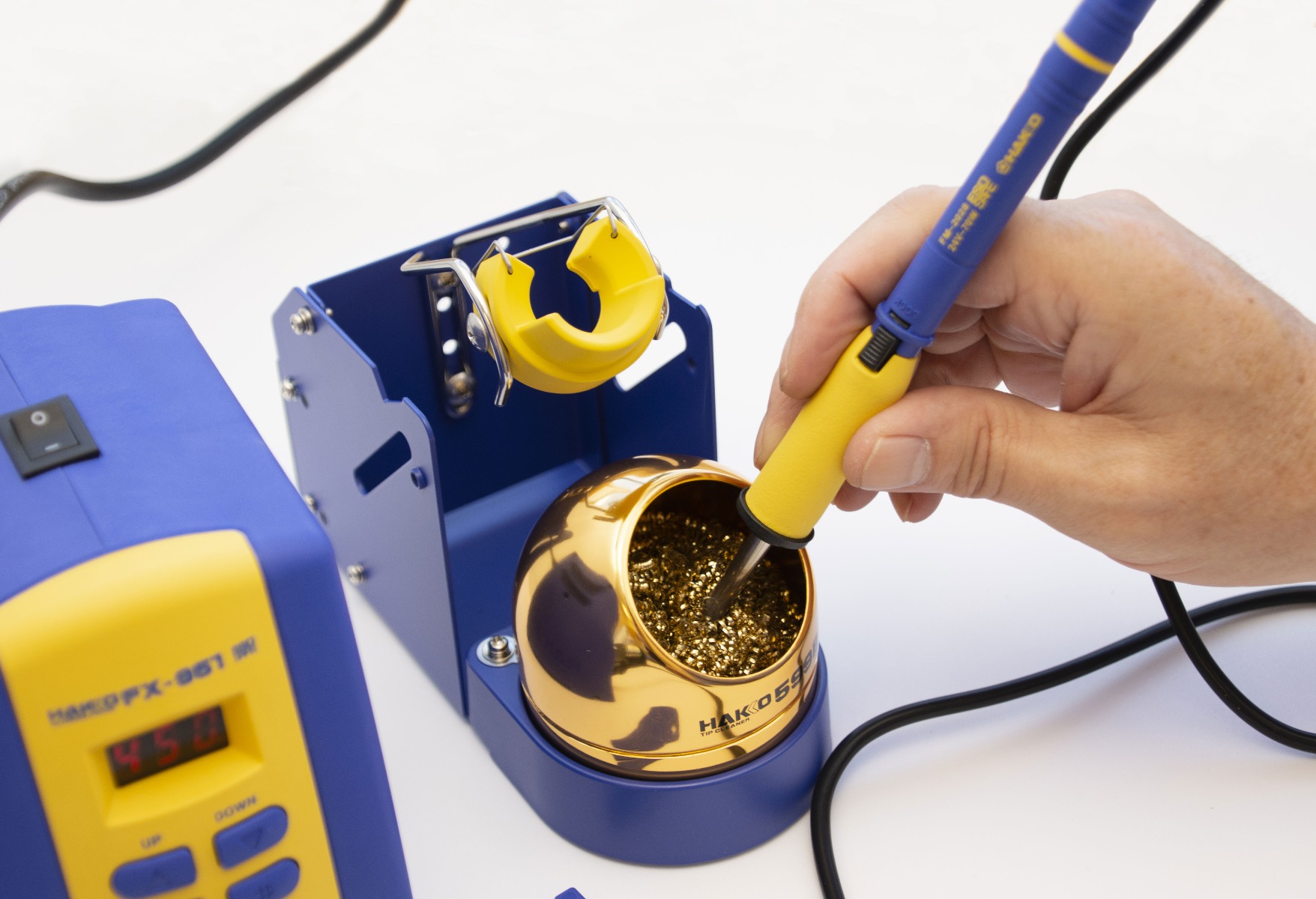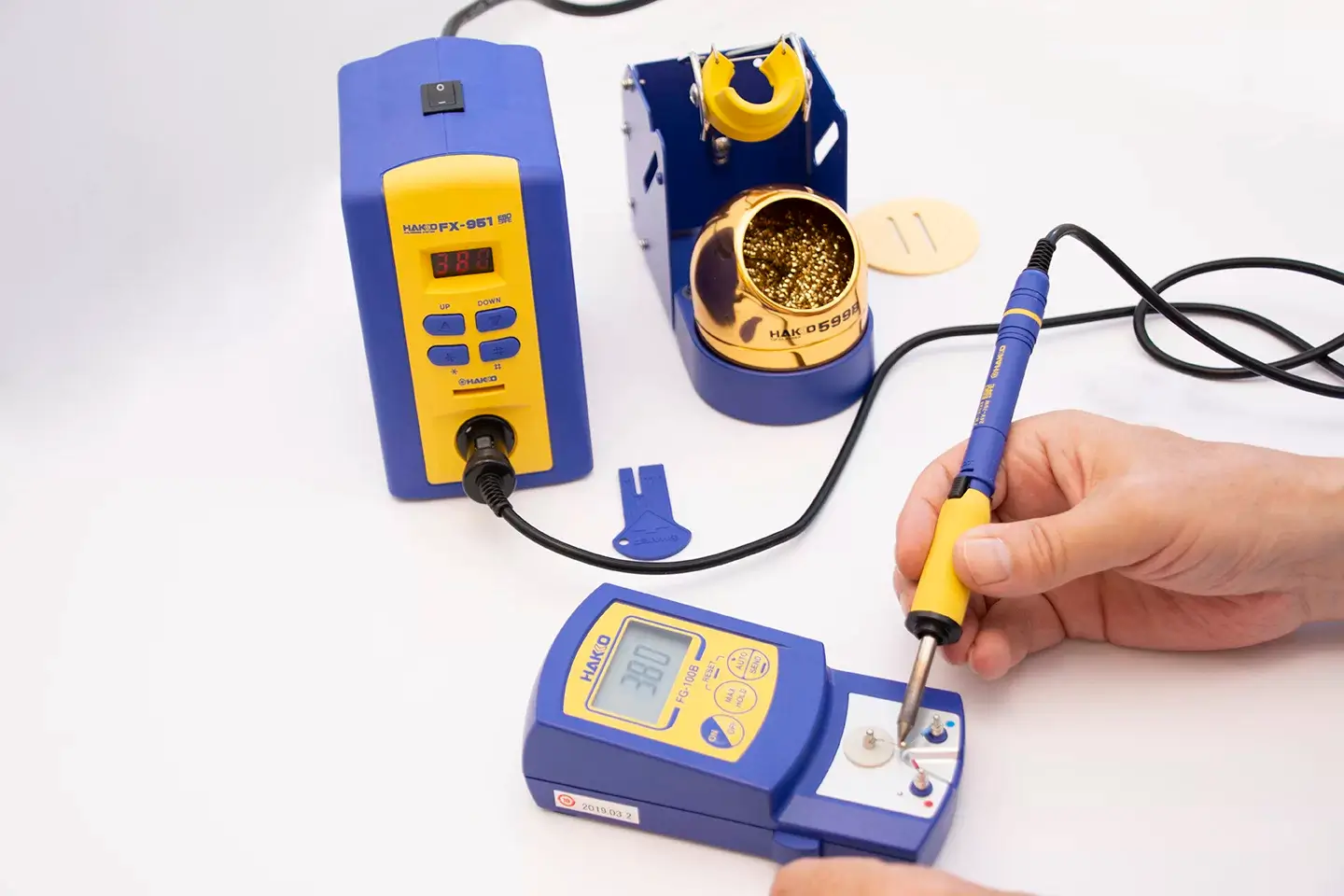No products in the basket.
Dereks Tech Tips – Issue 1

Effective Cleaning & Maintenance of Soldering Tips
Just to give you the flavour of our regular ‘Tech Tips’, we are happy to share our first instalment:
When using a soldering iron, heavy oxides can build up on your soldering tip. One of the most important things to do for effective soldering, is to always maintain a clean tip to ensure the proper amount of heat is transferred to the area that you are working on and also to ensure effective wetting of solder to the tip. Regularly maintaining your soldering tip will also save you replacing them so frequently. If the oxidisation on the tip is not too extreme, maintenance can be simply carried out by using HAKKO’s 599B. The 599B is made up of brass wires (599) in a convenient holder so you can easily work the tip to remove most of the oxides. The brass can also be replaced after substantial use.

For re-tinning soldering tips and removing oxidisation, the HAKKO FS-100 chemical paste is an essential workstation companion. Heat the oxidised tip to 350°C, then tin the soldering tip, clean off the FS-100 paste with any HAKKO tip cleaning sponge or the HAKKO 599B cleaning wire and check if the tip surface wets or not. This process will need to be repeated twice or more until the tip surface wets. Re-tinning is now completed but to prevent oxidisation, it is advisable to apply sufficient solder to the tip when soldering work is completed. Hakko 599B easily removes excess solder from the tip covering and ensures that there is an appropriate amount of solder remaining on the tip end. As a rule of thumb, it is good practice after finishing work, to clean the tip and apply new solder to the end of the tip. Also, make sure to turn the power off when not using the iron and we strongly suggest heating the tip to 350°C during the cleaning process as temperatures above 400°C can quickly form oxides after cleaning.
Another essential device for tip maintenance is the HAKKO FT-700 Tip Polisher. The FT-700 is ideal for extreme cases of oxidisation and is especially suitable for soldering tips oxidized by lead-free and high temperature solders. The FT-700 can be used just before you consider throwing a tip away and is a powerful piece of kit for removing heavy oxides and carbides. Firstly, place the oxidised tip, heated to 350°C, into the FT-700 to remove any oxide/carbide, then apply the FS-100 chemical paste to the tip when it’s hot and place the tip between the two spinning brass bristles in the FT-700. Following the removal of carbides and oxides, the tip is tinned with solder and cleaned. This process should be repeated at least twice to complete the cleaning process. Always keep the end of the tip coated with solder so as not to expose it to the air. For extra stubborn, firmly stuck carbides and oxides that cannot be removed even with the FT-700, first use the brush provided with the kit and repeat the cleaning process again. We recommend the brush as a last resort, as it can potentially leave small scratches on the iron plating surface of the tip. If you notice that the solder is not wetting the tip surface after removing the oxidation, it is time to replace the tip with a new one. The Hakko FT-710 Tip Cleaner also quickly and effectively cleans the soldering iron tip with the use of counter-rotating brushes to scrub away oxides, excess solder and debris. It is a fully enclosed unit preventing any splash-back of solder during the cleaning process. As with the FT-700 it helps to increase the life of your tip by keeping it clean and free from oxidation. Brushes are activated when the tip is pressed into the receptacle chamber, which accurately positions the tip for optimal cleaning. The FT-710 Tip Cleaner can be attached to the HAKKO iron holders FH-101, FH-200 and FH-201 using just 2 screws. It can also be placed next to other types of iron holders.

A further necessary maintenance tip for improved soldering and to periodically validate the production process, is to inspect the tip temperature daily. When oxidization affects the soldering tip, element cover and parts, heat conduction deteriorates and the tip temperature becomes lower, causing soldering difficulties and potentially defects. To quickly and accurately check the temperature of the tip, , HAKKO’s range of thermometers include the FG-100B, FG-101 and FG-102. The FG-100B automatically measures tip temperature via a fine sensor, the HAKKO FG-101 Soldering Iron Tester measures tip temperature, leak voltage and tip-to-ground resistance, and the FG-102 Tip temperature thermometer features a time-saving traceability management system and superior temperature measurement capability.
We hope you found the HAKKO maintenance tips useful and that it has highlighted the importance of regular maintenance and cleaning for even better performance and lifetime. In this series of Tech Tips, we will take a look at some issues you are sure to face and provide advice on how to overcome them. So look out for HAKKO Tech Tips next time, and in the meantime, feel free to contact us for any advice with your soldering, rework or extraction equipment questions.

